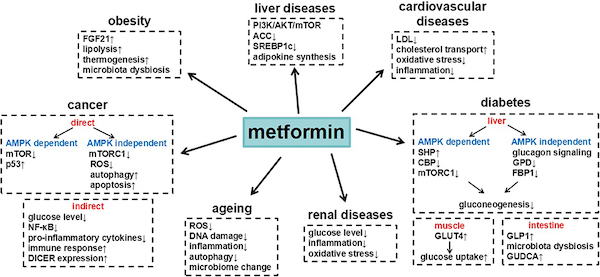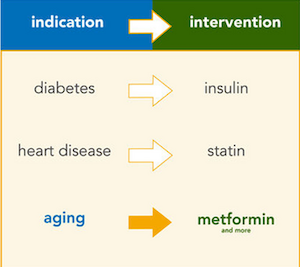Metformin Update: Keep Track of the Evolving Science

This Metformin Update page is needed to track the evolving science behind metformin, a proven diabetic drug that seeks to be repurposed to help lengthen life span. Get the latest on metformin here.
This “Metformin Update” page has been created to track the on-going studies that test metformin as a longevity drug. Metformin has been used to treat type 2 diabetes and prediabetes for several decades, but should you use it to enhance healthspan, or lifespan?
Quick answer: Unless you are prediabetic or have type 2 diabetes, probably not.
If you have not been prescribed metformin by your doctor because you’ve been diagnosed as having type 2 diabetes, or prediabetes, let the evidence I’m about to share persuade you not take it.
If you are not diabetic or prediabetic, but are taking metformin, consider hitting the pause button until more data that affirms its use for longevity purposes are made available.
Here’s what I’m going to cover in this post:
- Why metformin is studied as a potential longevity drug
- The evidence that disputes metformin’s longevity potential (for now)
- The TAME Trial seeks definitive answers about metformin’s efficacy
- Your Takeaway
Science rarely proceeds along a linear path — it zig zags, backtracks and lurches in various directions. That’s its nature. Different scientists, different labs using different techniques study something, like metformin, but not necessarily in the same way and with the same objective.
To underscore this point, let’s take a brief look at various studies that affirm the use of metformin as a longevity drug, and those that sow doubt.
Why Metformin Is Studied as a Potential Longevity Drug
Metformin has been used to treat type 2 diabetes for more than 60 years. It’s been useful for treating type 2 diabetes because metformin mimics some of the benefits of calorie restriction, such as improved physical performance, increased insulin sensitivity, and reduced LDL and cholesterol levels without a decrease in caloric intake.
At a molecular level, metformin increases AMP-activated protein kinase (AMPK) activity and increases antioxidant protection, resulting in reductions in both oxidative damage accumulation and chronic inflammation [1].
AMPK is a central regulator of energy homeostasis, which coordinates metabolic pathways, and thus balances nutrient supply with energy demand [2]. Given that type 2 diabetes is a metabolic disease, activating AMPK has a salutary effect.
Increased AMPK activation also has been shown to help reduce fat storage (especially dangerous belly fat), increase insulin sensitivity (to lower blood glucose), reduce cholesterol/triglyceride production and suppress chronic inflammation [3]. All of these factors underlie many of the diseases associated with aging.
Once it became clear that metabolically healthy type 2 diabetics treated with metformin were living longer than non-diabetics [4], scientists naturally wanted to know why, and that spurred a plethora of studies, many done with mice.
To cut to the chase, although several mice studies indicated that metformin offers benefits beyond treating blood glucose that could extend to lifespan gains, they often used a mouse cohort that was genetically inbred and had high blood pressure, a condition that could be ameliorated by metformin.
The Evidence that Disputes Metformin’s Longevity Potential (for now)
The condition of the subjects being studied matters. For instance, a 2008 study showed that metformin increased female mouse mean life span by 37.8%, but, again, these mice were not a healthy cohort, and therefore it is reasonable to expect that when compared to a group of unhealthy untreated mice, those unhealthy mice treated with metformin would live longer.
This point is underscored by a recent video (see below) made by Brad Stanfield, a medical doctor whose YouTube channel shares the latest research and clinical guidelines pertinent to longevity.
To validate this point about the nature of the subjects studies, Dr. Stanfield recounts a 2016 study conducted by the highly-respected National Institute on Aging Interventions Testing Program that simultaneously tested normal mice (not inbred, or altered) in three separate labs at the same time, and found that metformin did not extend lifespan.
OK, but what about us humans?
A 2014 observational human study showed that diabetics taking metformin appeared to live 15% longer compared to non-diabetics. But as Dr. Stanfield points out, observational studies are typically not robust, especially as compared to double blind placebo studies.
Perhaps that’s why a 2021 prospective interventional human study came to a different conclusion. It examined over 3,000 patients at high risk for type 2 diabetes, who were overweight, and with high fasting blood sugar. Half received metformin, half placebo. A 21-year follow-up period found no significant differences in death rates, cancer or heart disease.
If metformin didn’t provide any benefits for high-risk individuals, it’s highly unlikely that metformin would provide any benefits for those at low-risk, Dr. Stanfield concluded.
In a review of the metformin literature, a paper entitled, A Critical Review of the Evidence That Metformin Is a Putative Anti-Aging Drug That Enhances Healthspan and Extends Lifespan affirms the perspective that:
“… it remains controversial as to whether metformin is protective in those subjects free of disease. Furthermore, despite clinical use for over 60 years as an anti-diabetic drug, the cellular mechanisms by which metformin exerts either its actions remain unclear.”
The authors conclude:
“… despite data in support of anti-aging benefits, the evidence that metformin increases lifespan remains controversial. However, via its ability to reduce early mortality associated with various diseases, including diabetes, cardiovascular disease, cognitive decline and cancer, metformin can improve healthspan thereby extending the period of life spent in good health. Based on the available evidence we conclude that the beneficial effects of metformin on aging and healthspan are primarily indirect via its effects on cellular metabolism and result from its anti-hyperglycemic action, enhancing insulin sensitivity, reduction of oxidative stress and protective effects on the endothelium and vascular function.”
In other words, metformin may improve healthspan, possibly lifespan, in those who suffer from specific chronic diseases, especially those associated with metabolic dysfunction. But if you’re healthy and are interested in metformin to extend healthspan or lifespan, hit the pause button, particularly if you exercise or are concerned about your testosterone level, as I’ll soon address.
If you watched Dr. Stanfield’s video above, you may recall him reviewing a 2022 human study that examined older adults that were hyperglycemic, and thus at risk for developing type 2 diabetes. The researchers wanted to determine the effect metformin had on exercise performance over a 12-week period.
Two groups were formed. Both groups did aerobic exercise, but only one group took metformin, the other a placebo. The VO2 max of those taking metformin increased by half of that of the placebo group. In other words, metformin significantly blunted the beneficial effects of exercise.
Read: Can Metformin Side Effects Diminish Exercise.
Moreover, a 2021 study concluded that metformin lowers testosterone levels in males with Type 2 diabetes:
“In men with T2DM, 3-month metformin therapy can reduce testosterone levels, and counteract the testosterone elevation that accompanied with [sic] the improvement of blood glucose.”
I’m unsure if this is true for non-diabetic men, but given the precipitous decline in testosterone as men age, why take the chance?
In each case — the tests of VO2 max and testosterone — those being studied had hyperglycemia or type 2 diabetes, to which you could say, Perhaps it would be different for those with healthy levels of blood glucose?
Personally, I will not take the chance until the data better supports the health benefits derived by taking metformin in healthy populations. This is not because metformin is unsafe, but because I don’t want it to reduce my testosterone or blunt the beneficial effects of exercise, which currently the undeniably best thing you can do to age better.
And now to the TAME Trial, because if it goes as planned, many of these questions about the usefulness of metformin for healthy people will be answered.
TAME — the Ultimate Metformin Study
Led by AFAR (American Federation for Aging Research) Scientific Director Nir Barzilai, MD, the Targeting Aging with Metformin (TAME) Trial is a series of nationwide, six-year clinical trials at 14 leading research institutions across the country that will engage over 3,000 individuals between the ages of 65 to 79.
The TAME Trial will establish a clinical trial to provide proof-of-concept that aging can be treated, just as we treat diseases.
TAME will test whether those taking metformin experience delayed development or progression of age-related chronic diseases, such as heart disease, cancer, and dementia. It has not begun yet, as Dr. Barzilai and his associates need to raise the approximately $60 million required to run the trial.
As a part of the TAME effort, the researchers hope that the FDA will approve aging as an indication, to signify that aging can be “treated.” In medical terms, an “indication” for a drug refers to the use of that drug for treating a particular condition.
If aging is made an indication, the TAME Trial will mark a paradigm shift — from treating each age-related medical condition separately, to treating these conditions together by targeting aging itself.
Your Metformin Update Takeaway
The preponderance of data gleaned from many metformin studies using mouse and human cohorts do not show a clear benefit for non-diabetics.
What the research does indicate is that metformin blunts the beneficial effects of exercise and lowers testosterone, albeit in those with high blood glucose.
Consider these points:
- If you do not have high blood sugar and are taking metformin for other reasons, such as to improve overall healthspan or lifespan, pay close attention to unusual exercise fatigue, or lack of improvement from exercise, and check your testosterone.
- If you do not have high blood sugar and are not taking metformin, consider waiting till more definitive information is published about its effectiveness for healthy people.
- If you do have high blood sugar, talk to your doctor about taking metformin if you’re not already using it.
If your a Subscriber to this website, you’ll get notified when new scientific studies are published that are relevant to this Metformin Update webpage.
If you’re not a Subscriber, check this out and get on the list!
Any questions or comments can be typed into the Comments section below.
Last Updated on February 7, 2024 by Joe Garma






